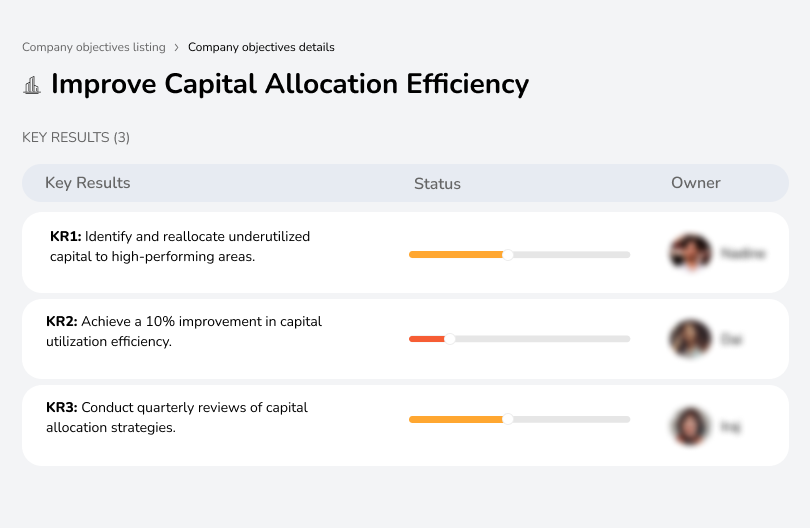Free OKR Templates
Download templatesThe CFO in healthcare manufacturing is responsible for safeguarding the company’s financial health and delivering strategic financial leadership. They manage budgeting, financial planning, cost control, and compliance to ensure long-term sustainability and profitability.
This role involves evaluating financial performance, optimising operational costs, and identifying investment opportunities that align with the company’s objectives. The CFO works closely with the executive team to support informed decision-making and effectively allocate resources to drive growth and innovation.
In healthcare manufacturing, the CFO maintains financial stability, ensures regulatory compliance, and provides the economic foundation to foster innovation and operational excellence in a competitive, highly regulated industry.
15 OKR Templates for CFO (Healthcare Manufacturing)
1. Challenge: Volatility in revenue streams impacts financial planning
Objective: Strengthen Financial Stability
Owned by: CFO
Due date: 6 months
- KR1: Maintain a minimum of 20% liquidity reserve for operational needs.
- KR2: Achieve a 10% reduction in operational expenses through cost optimization.
- KR3: Diversify revenue streams by introducing two new financial strategies.
2. Challenge: Inefficient budget distribution limits growth opportunities
Objective: Optimize Budget Allocation
Owned by: CFO
Due date: 5 months
- KR1: Conduct a comprehensive budget review across all departments within 2 months.
- KR2: Implement a company-wide project management tool to improve transparency and coordination.
- KR3: Increase cross-functional project success rate by 25%.
3. Challenge: Delayed payments and receivables disrupt cash flow
Objective: Enhance Cash Flow Management
Owned by: CFO
Due date: 6 months
- KR1: Reduce the average receivable collection period by 15 days.
- KR2: Negotiate extended payment terms with 50% of key suppliers.
- KR3: Increase monthly cash flow predictability to 95%.
4. Challenge: Limited contingency planning for financial risks
Objective: Strengthen Financial Risk Management
Owned by: CFO
Due date: 6 months
- KR1: Develop a financial risk mitigation framework covering 100% of critical areas.
- KR2: Conduct scenario-based financial stress tests quarterly.
- KR3: Reduce exposure to currency fluctuations by implementing hedging strategies.

5. Challenge: Delays in reporting hinder decision-making
Objective: Improve Financial Reporting Accuracy and Timeliness
Owned by: CFO
Due date: 3 months
- KR1: Automate 80% of financial reporting processes to reduce errors.
- KR2: Deliver monthly financial reports within 7 days of month-end.
- KR3: Achieve 100% compliance with financial reporting standards.

DevOps Templates: Click here
6. Challenge: Lack of financial readiness for potential opportunities
Objective: Support Strategic Mergers and Acquisitions
Owned by: CFO
Due date: 6 months
- KR1: Identify and evaluate three potential acquisition targets.
- KR2: Allocate 15% of the budget for strategic mergers and acquisitions.
- KR3: Increase post-acquisition integration efficiency by 25%.

7. Challenge: Rising procurement costs reduce margins
Objective: Drive Cost Efficiency in Procurement
Owned by: CFO
Due date: 5 months
- KR1: Negotiate a 10% cost reduction with top suppliers.
- KR2: Implement a procurement analytics tool to identify cost-saving opportunities.
- KR3: Achieve a 15% reduction in procurement overheads.
8. Challenge: Complex regulatory requirements lead to inefficiencies
Objective: Enhance Tax Planning and Compliance
Owned by: CFO
Due date: 4 months
- KR1: Conduct a tax compliance audit across all business units.
- KR2: Implement strategies to reduce tax liabilities by 10%.
- KR3: Achieve zero instances of non-compliance in tax reporting.
9. Challenge: Limited visibility into financial processes across departments
Objective: Increase Transparency in Financial Operations
Owned by: CFO
Due date: 5 months
- KR1: Implement a financial dashboard for real-time tracking of KPIs.
- KR2: Conduct monthly financial review meetings with all department heads.
- KR3: Achieve a 95% satisfaction rate from stakeholders on financial transparency.

10. Challenge: Lack of skill development opportunities limits team performance
Objective: Foster a High-Performing Finance Team
Owned by: CFO
Due date: 4 months
- KR1: Conduct financial skills training for 100% of team members.
- KR2: Improve team productivity by 15% through process automation.
- KR3: Achieve a 90% employee retention rate within the finance department.

11. Challenge: Legacy systems slow down financial processes
Objective: Advance Digital Transformation in Financial Operations
Owned by: CFO
Due date: 6 months
- KR1: Migrate 100% of financial data to a cloud-based system.
- KR2: Implement two new digital tools for expense tracking and reporting.
- KR3: Reduce manual financial processing time by 30%.

12. Challenge: Suboptimal allocation affects growth opportunities
Objective: Improve Capital Allocation Efficiency
Owned by: CFO
Due date: 5 months
- KR1: Identify and reallocate underutilized capital to high-performing areas.
- KR2: Achieve a 10% improvement in capital utilization efficiency.
- KR3: Conduct quarterly reviews of capital allocation strategies.







